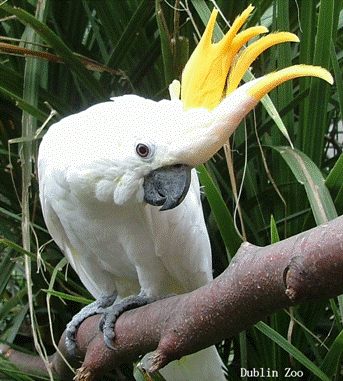This type of parrots are found in Sulawesi and East Nusa Tenggara. Body length ranges from 33-35 cm.
This type of cockatoo species have four sub-spesies.
1. Yellow-crested cockatoo (Cacatua sulphurea sulphurea).
This sub-species was found in Sulawesi Island and surrounding islands, like Mina, Butung, Land Jampea, Kayuadi, Kaleo, Kalatoa, Madi, and Tukangbesi Islands.
2. White-orange-crested cockatoo (C. s. titrinocristata), found in Sumba Island.
3. Abbot-small Cockatoo (C. s. abboti) were found on Masalembo Island and Masakambing Island.
4. Timor Cockatoo (C. s. parvula): found in Nusa Tenggara, as in Lombok, Sumbawa, Komodo, Rinca, Padar, Flores, Pantar, Alor and Timor Semau Island.
Population status
Around the world, this type of parrot is estimated there are 40 000, including in situ and ex situ. While each sub-species has different levels of scarcity.
Sulphurea sub-species can survive and the most are still found in Buton Island, ie 50-100 tails in the 1997 census.
Scattered parvula sub-species on several islands in Nusa Tenggara, among which have been reported in most populations of Komodo island as much as 85-90 tails (census 1995) and in Moyo Island is estimated there are 1600 male (1981 census).
Citrinocristata sub-species is estimated that between 1150-2644 (1995 analysis) that have undergone severe population decline in 1986-1989, and reached 80%.
The rarest sub-species, namely abboti that currently only the remaining 5 mice in Masakambing Island (1997 census). The trend was mainly due to the scarcity of arrest for trading and also because of its natural habitat destruction.
Meanwhile, in habitats ranging from plantation areas, forest edge to forest with an altitude of 800 m above sea level continued to experience erosion.
This type of cockatoo are protected under Indonesia Government Regulation No. 7/1999 on the Preservation of Plants and Wild Animals.
Related articles:


bagus banget.ni blog memberi saya pengetahuan tentang burung yang bagus